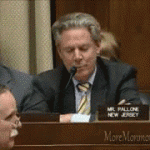Christie Vetos ObamaCare Exchange
Governor Christie Continues Prudent Approach to Federal Health Care Implementation with Veto of State-Run Exchange Legislation
Veto Avoids Saddling State Taxpayers with Huge, Open-Ended Exchange Costs Without Comparative Details of Alternatives from the Federal Government
Trenton, NJ – Continuing a careful and thoughtful approach that appropriately considers the best interests of the state’s residents and taxpayers, Governor Chris Christie today vetoed legislation that would have begun to establish a State-based health care exchange in New Jersey in line with the federal Affordable Care Act. Though December 14, 2012 is the deadline for states to decide whether to establish a State-based Exchange, the federal government has failed to provide critical information and to answer basic questions about the operation and implementation of each of the options provided, making any decision made now hasty, incomplete, and perhaps fiscally detrimental to the taxpayers of New Jersey.
Governor Christie has consistently stated that once legal issues surrounding the Affordable Care Act were settled, New Jersey would comply with the federal mandate, but only in the most responsible way among the available alternatives. The creation of health care exchanges is provided for in the Affordable Care Act as the vehicle for eligible individuals and businesses to access care, with three exchange options being given to states: Federally Facilitated, Partnership, or State-based. Though the federal government’s deadline for states to select the type of exchange they will participate in is nearly here, New Jersey and all other states still await substantial federal guidance on all three options.
“We will comply with the Affordable Care Act, but only in the most efficient and cost effective way for New Jersey taxpayers. Such an important decision as how to best move forward for New Jerseyans can only be understood and reasonably made when fairly and fully compared to the overall value of the other options. Until the federal government gives us all the necessary information, any other action than this would be fiscally irresponsible,” said Governor Christie. “Thus far, we lack such critical information from the federal government. I will not ask New Jerseyans to commit today to a State-based Exchange when the federal government cannot tell us what it will cost, how that cost compares to other options, and how much control they will give the states over this option that comes at the cost of our state’s taxpayers.”
Governor Christie has previously and continually cited the importance – both from a fiscal and health care policy perspective – of having additional clarity and guidance from the federal government on a host of critical issues related to implementation of the Affordable Care Act at the state level. Absent this critical information about cost, cost-sharing, scope of control, and the federal rulemaking landscape, New Jersey cannot fairly evaluate the best or most fiscally prudent path to follow for its residents.
“Financing the building and implementation of a State-based Exchange would be an extraordinarily costly endeavor,” continued Governor Christie. “While the federal governmental has enabled states to apply for grant funding to cover some of the initial costs of such an endeavor, the total price for such a program has never been quantified, and is likely to be onerous. Without knowing the full scope of which Exchange option would be most beneficial and cost efficient for New Jerseyans, it would be irresponsible to force such a bill on our citizens.”
In addition to the unknown cost and operation of a State-based Exchange, Governor Christie also cited the following areas or issues of other Exchange implementation options that lack complete information:
- Costs in Federally Facilitated or Partnership Exchanges: While “user fees” paid by insurers have been identified as a financing mechanism for Federally Facilitated or Partnership Exchanges, only late last week did the federal government offer a preliminary glimpse as to what those costs might include. Questions linger on the sharing of user-fees in Partnership Exchanges.
- Federal Exchange Operations: The federal government has yet to present a structured blueprint for the design and operation of a Federally Facilitated Exchange and the technical details for its linkage to each state.
- Federal Rulemaking: The last several weeks have trigged a restart of proposed federal regulations relating to the Affordable Care Act, guidance has come from Washington at an erratic pace, and there exists no predictable plan for future rulemaking.
In vetoing the legislation, the Governor also made clear that New Jersey’s right to further consideration on the matter is reserved for later in the implementation process, as the federal government has provided states with the flexibility to amend Exchange selection in subsequent years. If and when additional information becomes available to make a more complete and fully informed determination for the people of New Jersey, it will be welcomed and considered.
Primary sponsors of S-2135 include Senators Nia Gill and Joseph Vitale and Assemblymembers Upendra Chivukula, Herb Conaway, Ruben Ramos, and Troy Singleton.










